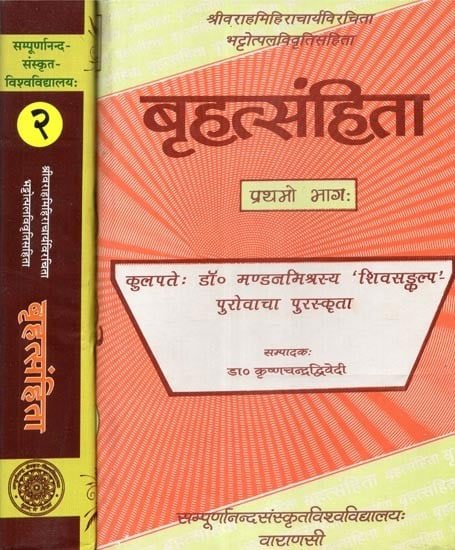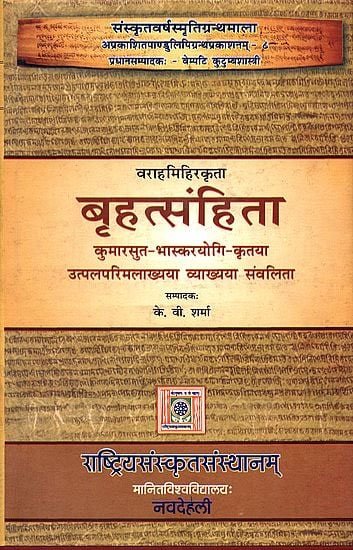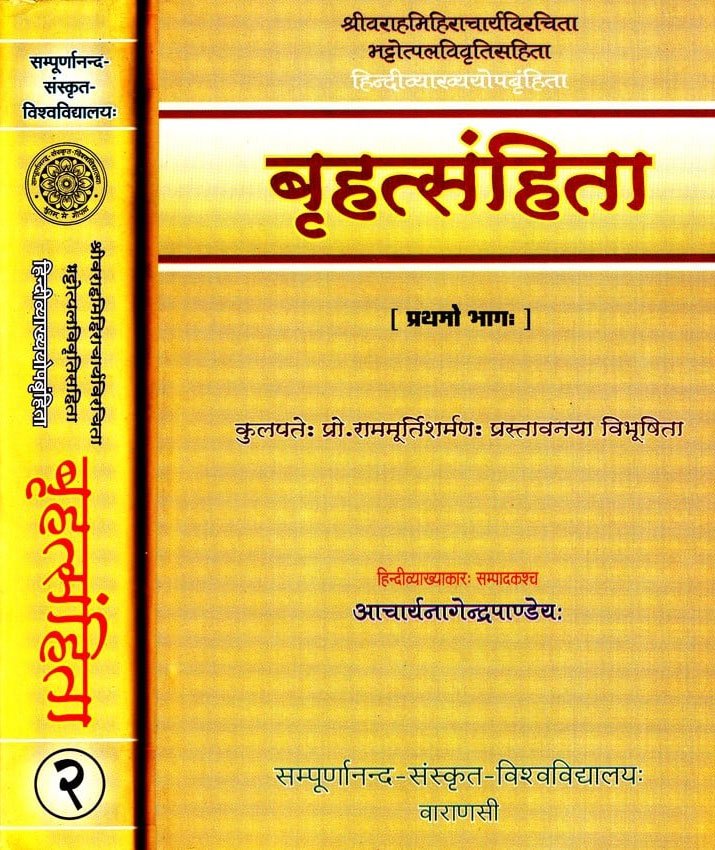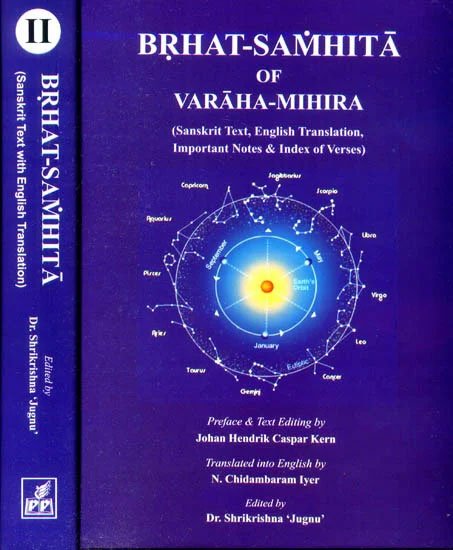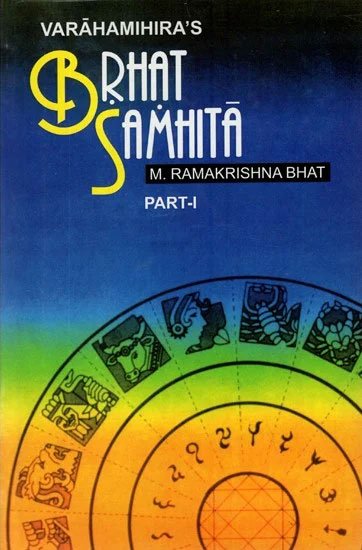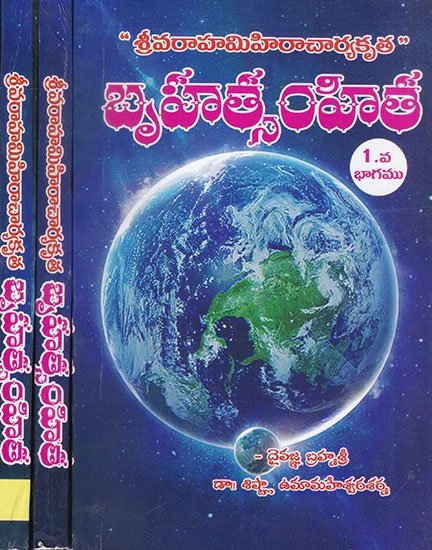Brihat-samhita [sanskrit]
26,560 words
The Sanskrit text of the Brihat-samhita from the 6th-century authored by Varaha Mihira in present-day Ujjain, India. It primarily deals with astrology and astronomy but is presented as an encyclopedia of knowledge.
Verse 104.13
यावन्नक्षत्रमाला विचरति गगने भूषयन्ती इह भासा तावन्नक्षत्रभूतो विचरति सह तैर्ब्रह्मणोऽह्नोऽवशेषम् ।
कल्पादौ चक्रवर्ती भवति हि मतिमांस्तत्क्षयाच्चापि भूयः संसारे जायमानो भवति नरपतिर्ब्राह्मणो वा धनाढ्यः ॥ १३ ॥
yāvannakṣatramālā vicarati gagane bhūṣayantī iha bhāsā tāvannakṣatrabhūto vicarati saha tairbrahmaṇo'hno'vaśeṣam |
kalpādau cakravartī bhavati hi matimāṃstatkṣayāccāpi bhūyaḥ saṃsāre jāyamāno bhavati narapatirbrāhmaṇo vā dhanāḍhyaḥ || 13 ||
The Sanskrit text of Verse 104.13 is contained in the book Brihata Samhita (Sanskrit Text with Hindi Translation) by Pandit Achyutananda Jha. This book is available online or you could buy the latest edition:
Read online Buy now! The Sanskrit text by Pandit Achyutananda Jha (2001)
Glossary of Sanskrit terms
Note: This extracts Sanskrit terms and links to English definitions from the glossary, based on an experimental segmentation of verse (104.13). Some terms could be superfluous while some might not be mentioned. Click on the word to show English definitions.
Yavan, Yavat, Akshatra, Ala, Gagana, Bhushayat, Bhushayanti, Iha, Bhas, Bhasa, Tavat, Bhuta, Bhutas, Saha, Tad, Brahman, Brahmana, Ahan, Avashesham, Avashesha, Kalpadi, Cakravartin, Cakravarti, Bhavati, Bhavat, Bhavant, Matimat, Tat, Kshaya, Capin, Capi, Bhuyah, Bhuyas, Samsara, Samsari, Jayamana, Narapati, Var, Dhanadhya,
Analysis of Sanskrit grammar
Note: this is an experimental feature and only shows the first possible analysis of the Sanskrit text (Verse 104.13). If the system was successful in segmenting the sentence, you will see of which words it is made up of, generally consisting of Nouns, Pronouns, Verbs, Participles and Indeclinables. Click on the link to show all possible derivations of the word.
- Line 1: “yāvannakṣatramālā vicarati gagane bhūṣayantī iha bhāsā tāvannakṣatrabhūto vicarati saha tairbrahmaṇo'hno'vaśeṣam ”
- yāvann -
-
yāvan (noun, masculine)[vocative single]yāvat (noun, masculine)[vocative single]
- akṣatram -
-
akṣatra (noun, masculine)[adverb], [accusative single]akṣatra (noun, neuter)[adverb], [nominative single], [accusative single]akṣatrā (noun, feminine)[adverb]
- ālā* -
-
āla (noun, masculine)[nominative plural], [vocative plural]
- vi -
-
vi (indeclinable adverb)[indeclinable adverb]vi (indeclinable preposition)[indeclinable preposition]vi (noun, masculine)[compound], [adverb]vi (noun, neuter)[compound], [adverb], [nominative single], [vocative single], [accusative single]ve (noun, masculine)[adverb]vī (noun, feminine)[adverb]vī (noun, masculine)[adverb]vī (noun, neuter)[compound], [adverb], [nominative single], [vocative single], [accusative single]vi (Preverb)[Preverb]
- carati -
-
√car (verb class 1)[present active third single]
- gagane -
-
gagana (noun, neuter)[nominative dual], [vocative dual], [accusative dual], [locative single]
- bhūṣayantī -
-
√bhūṣ -> bhūṣayantī (participle, feminine)[compound from √bhūṣ], [adverb from √bhūṣ]√bhūṣ -> bhūṣayat (participle, neuter)[nominative dual from √bhūṣ], [nominative plural from √bhūṣ], [vocative dual from √bhūṣ], [vocative plural from √bhūṣ], [accusative dual from √bhūṣ], [accusative plural from √bhūṣ]√bhūṣ -> bhūṣayantī (participle, feminine)[nominative single from √bhūṣ], [vocative single from √bhūṣ]√bhūṣ (verb class 0)[present active third plural]
- iha -
-
iha (indeclinable adverb)[indeclinable adverb]iha (indeclinable)[indeclinable]
- bhāsā -
-
bhās (noun, feminine)[instrumental single]bhāsā (noun, feminine)[nominative single]
- tāvann -
-
tāvat (noun, masculine)[vocative single]
- akṣatra -
-
akṣatra (noun, masculine)[compound], [vocative single]akṣatra (noun, neuter)[compound], [vocative single]
- bhūto* -
-
bhūtas (noun, neuter)[compound], [nominative single], [vocative single], [accusative single]bhūta (noun, masculine)[nominative single]
- vi -
-
vi (indeclinable adverb)[indeclinable adverb]vi (indeclinable preposition)[indeclinable preposition]vi (noun, masculine)[compound], [adverb]vi (noun, neuter)[compound], [adverb], [nominative single], [vocative single], [accusative single]ve (noun, masculine)[adverb]vī (noun, feminine)[adverb]vī (noun, masculine)[adverb]vī (noun, neuter)[compound], [adverb], [nominative single], [vocative single], [accusative single]vi (Preverb)[Preverb]
- carati -
-
√car (verb class 1)[present active third single]
- saha -
-
saha (indeclinable postposition)[indeclinable postposition]saha (noun, masculine)[compound], [vocative single]saha (noun, neuter)[compound], [vocative single]√sah (verb class 1)[imperative active second single]
- tair -
-
ta (noun, masculine)[instrumental plural]ta (noun, neuter)[instrumental plural]tad (noun, neuter)[instrumental plural]sa (noun, masculine)[instrumental plural]
- brahmaṇo' -
-
brahman (noun, neuter)[ablative single], [genitive single]brahmaṇa (noun, masculine)[nominative single]
- ahno' -
-
ahan (noun, neuter)[ablative single], [genitive single]
- avaśeṣam -
-
avaśeṣam (indeclinable)[indeclinable]avaśeṣa (noun, neuter)[adverb], [nominative single], [accusative single]
- Line 2: “kalpādau cakravartī bhavati hi matimāṃstatkṣayāccāpi bhūyaḥ saṃsāre jāyamāno bhavati narapatirbrāhmaṇo vā dhanāḍhyaḥ ”
- kalpādau -
-
kalpādi (noun, masculine)[locative single]
- cakravartī -
-
cakravartī (noun, masculine)[compound]cakravartī (noun, feminine)[compound], [nominative single]cakravartin (noun, masculine)[nominative single]
- bhavati -
-
bhavatī (noun, feminine)[adverb], [vocative single]bhavat (noun, masculine)[locative single]bhavat (noun, neuter)[locative single]bhavant (pronoun, masculine)[locative single]bhavant (pronoun, neuter)[locative single]√bhū (verb class 1)[present active third single]
- hi -
-
hi (indeclinable particle)[indeclinable particle]
- matimāṃs -
-
matimat (noun, masculine)[nominative single]
- tat -
-
tat (indeclinable correlative)[indeclinable correlative]tad (noun, neuter)[compound], [nominative single], [accusative single]
- kṣayāc -
-
kṣaya (noun, masculine)[adverb], [ablative single]kṣaya (noun, neuter)[adverb], [ablative single]
- cāpi -
-
cāpin (noun, masculine)[compound], [adverb]cāpin (noun, neuter)[compound], [adverb], [nominative single], [vocative single], [accusative single]cāpī (noun, masculine)[compound], [adverb]cāpī (noun, feminine)[compound], [adverb], [vocative single]cāpī (noun, neuter)[compound], [adverb], [nominative single], [vocative single], [accusative single]cāpi (noun, masculine)[compound], [adverb]cāpi (noun, feminine)[compound], [adverb]cāpi (noun, neuter)[compound], [adverb], [nominative single], [vocative single], [accusative single]
- bhūyaḥ -
-
bhūyaḥ (indeclinable)[indeclinable]bhūyas (noun, masculine)[compound], [adverb]bhūyas (noun, neuter)[compound], [adverb], [nominative single], [vocative single], [accusative single]
- saṃsāre -
-
saṃsāra (noun, masculine)[locative single]saṃsāri (noun, masculine)[vocative single]saṃsāri (noun, feminine)[vocative single]
- jāyamāno* -
-
jāyamāna (noun, masculine)[nominative single]√jai -> jāyamāna (participle, masculine)[nominative single from √jai class 1 verb]√jan -> jāyamāna (participle, masculine)[nominative single from √jan class 4 verb]
- bhavati -
-
bhavatī (noun, feminine)[adverb], [vocative single]bhavat (noun, masculine)[locative single]bhavat (noun, neuter)[locative single]bhavant (pronoun, masculine)[locative single]bhavant (pronoun, neuter)[locative single]√bhū (verb class 1)[present active third single]
- narapatir -
-
narapati (noun, masculine)[nominative single]
- brāhmaṇo* -
-
brāhmaṇa (noun, masculine)[nominative single]
- vā* -
-
vār (noun, masculine)[adverb], [nominative single], [vocative single]vār (noun, neuter)[adverb], [nominative single], [vocative single], [accusative single]va (noun, masculine)[nominative plural], [vocative plural]vā (noun, feminine)[nominative plural], [vocative plural], [accusative plural]
- dhanāḍhyaḥ -
-
dhanāḍhya (noun, masculine)[nominative single]
Other editions:
Also see the following editions of the Sanskrit text or (alternative) English translations of the Verse 104.13
Brhatsamhita with the Commentary of Bhattotpala
by Krishna Chandra Dwivedi (2016)
Publisher: Sampurnanand Sanskrit University; 1229 pages;
Buy now!
Brihat Samhita with the Commentary of Utpalapatimala of Yogisvara
by K. V. Sharma (2012)
Publisher: Rashtriya Sanskrit Sansthan, Janakpuri; 754 pages; ISBN-10; 8186111360; ISBN-13: 9788186111369
Buy now!
Brihat Samhita (Hindi Translation)
by K. V. Sharma (2002)
Publisher: Sampurnanand Sanskrit University; 2359 pages; ISBN-13: 9789387890008.
Buy now!
Brhat Samhita (English translation)
by N. Chidambaram Iyer (2022)
Publisher: Parimal Publication Pvt. Ltd.; 801 pages; Edited by Dr. Shrikrishna Jugnu; ISBN-10: 8171104215; ISBN-13: 9788171104215.
Buy now!
Brhat Samhita (English with notes)
by M. Ramakrishna Bhat (2010)
Publisher: Motilal Banarsidas Publishers Pvt. Ltd.; 1155 pages; ISBN-10: 8120810600; ISBN-13: 9788120810600.
Buy now!
Brhat Samhita (Telugu translation)
by Sishtla Umamaheswara Sharma (2020)
Publisher: Mohan Publications, Andhra Pradesh; 846 pages.
Buy now!Preview of verse 104.13 in Kannada sript:
ಯಾವನ್ನಕ್ಷತ್ರಮಾಲಾ ವಿಚರತಿ ಗಗನೇ ಭೂಷಯನ್ತೀ ಇಹ ಭಾಸಾ ತಾವನ್ನಕ್ಷತ್ರಭೂತೋ ವಿಚರತಿ ಸಹ ತೈರ್ಬ್ರಹ್ಮಣೋಽಹ್ನೋಽವಶೇಷಮ್ ।
ಕಲ್ಪಾದೌ ಚಕ್ರವರ್ತೀ ಭವತಿ ಹಿ ಮತಿಮಾಂಸ್ತತ್ಕ್ಷಯಾಚ್ಚಾಪಿ ಭೂಯಃ ಸಂಸಾರೇ ಜಾಯಮಾನೋ ಭವತಿ ನರಪತಿರ್ಬ್ರಾಹ್ಮಣೋ ವಾ ಧನಾಢ್ಯಃ ॥ ೧೩ ॥
Brhat Samhita (Gujarati translation)
by - (2000)
Publisher: Shree Harihar Pustakalay, Surat; Author: Shri Varahamihira Acharya (શ્રી વરાહમિહીરાચાર્ય); 432 pages.
Buy now!Preview of verse 104.13 in Gujarati sript:
યાવન્નક્ષત્રમાલા વિચરતિ ગગને ભૂષયન્તી ઇહ ભાસા તાવન્નક્ષત્રભૂતો વિચરતિ સહ તૈર્બ્રહ્મણોઽહ્નોઽવશેષમ્ ।
કલ્પાદૌ ચક્રવર્તી ભવતિ હિ મતિમાંસ્તત્ક્ષયાચ્ચાપિ ભૂયઃ સંસારે જાયમાનો ભવતિ નરપતિર્બ્રાહ્મણો વા ધનાઢ્યઃ ॥ ૧૩ ॥
Brhat Samhita (Kannada translation)
by Sripada Raghunatha Kulkarni (2021)
Publisher: Srinidhi Publications, Bangalore; 668 pages with illustrations.
Buy now!Preview of verse 104.13 in Kannada sript:
ಯಾವನ್ನಕ್ಷತ್ರಮಾಲಾ ವಿಚರತಿ ಗಗನೇ ಭೂಷಯನ್ತೀ ಇಹ ಭಾಸಾ ತಾವನ್ನಕ್ಷತ್ರಭೂತೋ ವಿಚರತಿ ಸಹ ತೈರ್ಬ್ರಹ್ಮಣೋಽಹ್ನೋಽವಶೇಷಮ್ ।
ಕಲ್ಪಾದೌ ಚಕ್ರವರ್ತೀ ಭವತಿ ಹಿ ಮತಿಮಾಂಸ್ತತ್ಕ್ಷಯಾಚ್ಚಾಪಿ ಭೂಯಃ ಸಂಸಾರೇ ಜಾಯಮಾನೋ ಭವತಿ ನರಪತಿರ್ಬ್ರಾಹ್ಮಣೋ ವಾ ಧನಾಢ್ಯಃ ॥ ೧೩ ॥
![Brihat-samhita [sanskrit] - book cover](/uploads/a/Brihat-Samhita-Sanskrit.jpg)
